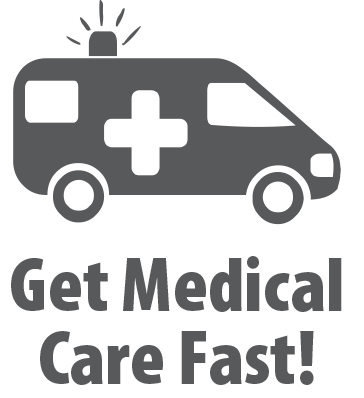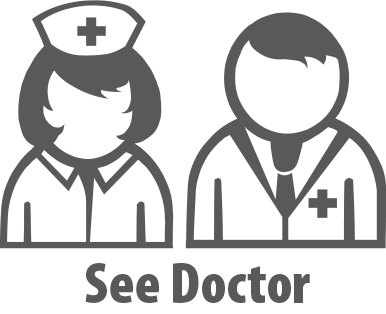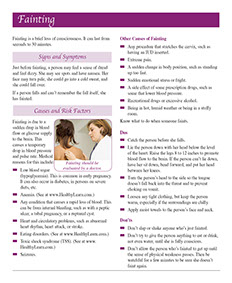Women's Health
Fainting
Fainting is a brief loss of consciousness. It can last from seconds to 30 minutes.
Signs & Symptoms
Just before fainting, a person may feel a sense of dread and feel dizzy. She may see spots and have nausea. Her face may turn pale, she could go into a cold sweat, and she could fall over.
If a person falls and can’t remember the fall itself, she has fainted.
Causes
Fainting is due to a sudden drop in blood flow or glucose supply to the brain. This causes a temporary drop in blood pressure and pulse rate. Medical reasons for this include:
• Low blood sugar (hypoglycemia). This is common in early pregnancy. It can also occur in diabetes, in persons on severe diets, etc.
• Anemia.
• Any condition that causes a rapid loss of blood. This can be from internal bleeding, such as with a peptic ulcer, a tubal pregnancy, or a ruptured cyst.
• Heart and circulatory problems, such as abnormal heart rhythm, heart attack, or stroke.
• Eating disorders.
• Toxic shock syndrome (TSS).
• Seizures.
Other Causes of Fainting
• Any procedure that stretches the cervix, such as having an IUD inserted.
• Extreme pain.
• A sudden change in body position, such as standing up too fast.
• Sudden emotional stress or fright.
• A side effect of some prescription drugs, such as some that lower blood pressure.
• Recreational drugs or excessive alcohol.
• Being in hot, humid weather or being in a stuffy room.
Know what to do when someone faints.
Dos
• Catch the person before she falls.
• Lie the person down with her head below the level of the heart. Raise the legs 8 to 12 inches to promote blood flow to the brain. If the person can’t lie down, have her sit down, bend forward, and put her head between her knees.
• Turn the person’s head to the side so the tongue doesn’t fall back into the throat and to prevent choking on vomit.
• Loosen any tight clothing, but keep the person warm, especially if the surroundings are chilly.
• Apply moist towels to the person’s face and neck.
Don’ts
• Don’t slap or shake anyone who’s just fainted.
• Don’t try to give the person anything to eat or drink, not even water, until she is fully conscious.
• Don’t allow the person who’s fainted to get up until the sense of physical weakness passes. Then be watchful for a few minutes to be sure she doesn’t faint again.
Questions to Ask
Question
01
With fainting, are any “Signs & Symptoms–For a Heart Attack” present?

Call 911
Get medical care without delay. If symptoms are life threatening go to the ER or call 9-1-1. Don’t call 9-1-1 or use the ER if symptoms do not threaten life. Ask your doctor ahead of time where you should go for a problem that needs prompt care, but not emergency care.
x
Question
02
With fainting, do stroke signs occur?
• Sudden numbness or weakness of the face, arm or leg, especially on one side of the body.
• Sudden trouble seeing in one or both eyes.
• Sudden trouble walking, dizziness, loss of balance or coordination.
• Sudden, severe headache.

Call 911
Get medical care without delay. If symptoms are life threatening go to the ER or call 9-1-1. Don’t call 9-1-1 or use the ER if symptoms do not threaten life. Ask your doctor ahead of time where you should go for a problem that needs prompt care, but not emergency care.
x
Question
03
Is the person not breathing or did fainting occur after a head injury?

Get medical care without delay. If symptoms are life threatening go to the ER or call 9-1-1. Don’t call 9-1-1 or use the ER if symptoms do not threaten life. Ask your doctor ahead of time where you should go for a problem that needs prompt care, but not emergency care.
x
Question
04
With fainting, do you have severe pain in the pelvis or abdomen, black stools or blood in the stools or urine?

You should be seen by your doctor for medical advice. Contact your doctor or health care provider to find out how soon you should be seen.
x
Question
05
Have you fainted more than once?

You should be seen by your doctor for medical advice. Contact your doctor or health care provider to find out how soon you should be seen.
x
Question
06
Are you taking high blood pressure drugs or have you taken a new or increased dose of a prescribed drug?

Call your doctor or health care provider and state the problem. He or she can decide what you should do.
x
Self-Care / Prevention
• When you feel faint, lie down and elevate both legs. Or, sit down, bend forward and put your head between your knees.
• Get up slowly from bed or from a sitting position.
• Follow your doctor’s advice to treat any condition which may lead to fainting. Take prescribed medicines, but tell your doctor about any side effects, so he or she can monitor your condition.
• Don’t wear tight clothing around your neck.
• Avoid turning your head suddenly.
• Stay out of stuffy rooms and hot, humid places. If you can’t, use a fan.
• If you have fainting spells often, avoid activities that can put lives in danger, such as driving a car.
• Drink a lot of fluids, but drink alcoholic ones in moderation, if at all. Eat small, frequent meals.
When Pregnant
• Get out of bed slowly.
• Keep crackers at your bedside and eat a few before getting out of bed.
• Eat small, frequent meals instead of a few large ones. With each meal, have a good source of protein, such as lean meat, low-fat cheese, milk, etc. Avoid sweets. Don’t skip meals or go for a long time without eating. Drink plenty of fluids.
• Don’t sit for long periods of time. Elevate your legs when you sit.
• When you stand, as in a line, move your legs to pump blood up to your heart.
• Take vitamin and mineral supplements, as your doctor prescribes.
• Don’t lay on your back during the 2nd and 3rd trimesters of your pregnancy. Lie on your left side. When you can’t, lie on your right side.

Download an offline pdf file.
RELATED ARTICLES
<
>
2021 © American Institute for Preventive Medicine - All Rights Reserved. Disclaimer | www.HealthyLife.com








